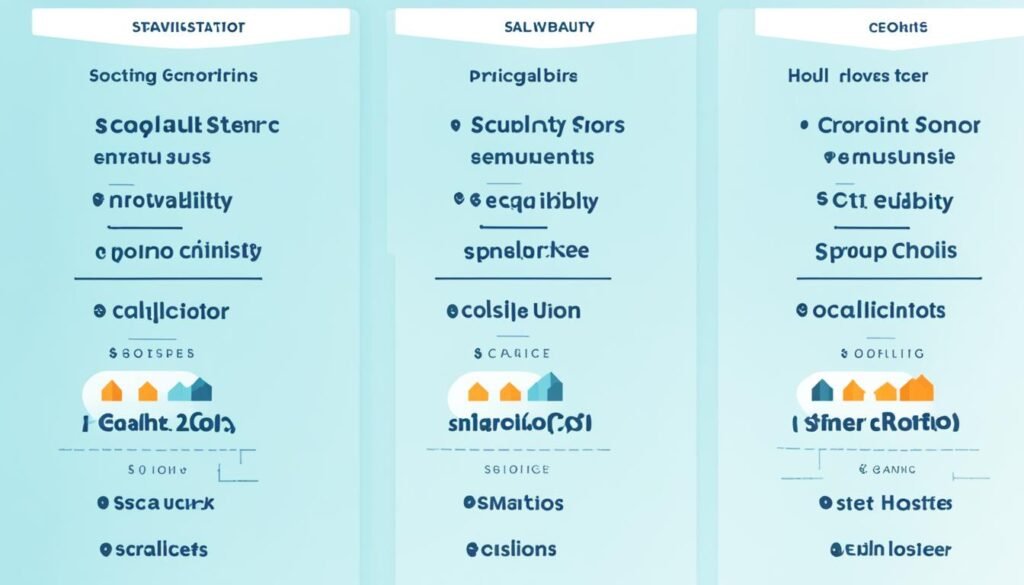Maximizing Your Website’s Potential: Your website is key to your online presence in today’s fast-paced digital world. The web hosting market is huge, worth $108.54 billion in 2023. Choosing the right web host is vital for your site’s success and reliability. It makes sure your site is easy to reach, safe, and quick for visitors.
Managed hosting is crucial for boosting your website’s potential. It offers server monitoring, security, regular updates, high uptime, and fast performance. With managed hosting, you can focus on your business while the hosting service takes care of the tech stuff.
Key Takeaways
- The global web hosting industry is valued at $108.54 billion, emphasizing the importance of selecting the right web host.
- Your website’s success and reliability are directly linked to your choice of web hosting service.
- Managed hosting can maximize your website’s potential by providing features like server monitoring, website security, and high uptime.
- Managed hosting allows you to focus on your core business objectives while the hosting provider handles the technical complexities.
- A well-chosen web hosting service can enhance your website’s accessibility, security, and performance for visitors.
The Essence of Web Hosting
When you create a website, it needs a place to live on the internet. This is where web hosting comes in. Web hosting services let users buy space to keep their websites. There are different types of web hosting, each with its own benefits and uses.
Understanding the Concept of Web Hosting
Web hosting means storing and managing a website’s files on a server. This makes sure people can visit the website online. Hosting providers offer services like shared hosting, dedicated hosting, VPS hosting, and cloud hosting. Each type meets different needs of website owners.
Types of Web Hosting Services
Here are the main types of web hosting services:
- Shared Hosting: Many websites share one server. It’s a budget-friendly choice for small to medium sites with not too much traffic.
- Dedicated Hosting: A site gets its own server. This gives more control, resources, and speed but costs more.
- VPS (Virtual Private Server) Hosting: It’s between shared and dedicated hosting. It offers more resources and flexibility than shared hosting.
- Cloud Hosting: Websites use a network of servers. This provides scalability, flexibility, and always being available.
Choosing the right web hosting service depends on the website’s size, traffic, and needs. Knowing about the web hosting concept and the different services helps website owners make the best choice. This ensures their website works well and is reliable.
Choosing the Right Web Host

Finding the perfect web host is key to your website’s success. You need to think about several things, like how much bandwidth and traffic your site needs, how much storage you’ll use, if you can manage many domains, and what email services you want.
Bandwidth and Traffic Considerations
Bandwidth is what lets your website handle visitors and page views. Picking a host with enough bandwidth means your site won’t slow down during busy times. This keeps your visitors happy.
Storage Capacity
The storage your web host offers affects how much content you can have on your site. This includes things like images, videos, documents, and databases. Choosing a host with lots of storage means your site can grow with you.
Multiple Domain Management
If you need to manage many domains with one hosting account, find a host that lets you do this. Being able to manage different domains under one roof can make your brand look better and more professional.
Email Hosting
Having professional email services with your domain name can make your brand stronger and improve communication. Look for a host that offers reliable email services for your needs, whether for business or personal use.
Choosing the right web host is a big decision that affects your site’s performance and growth. Think about bandwidth, storage, managing domains, and email hosting to pick a host that fits your needs now and in the future.
| Feature | Importance |
|---|---|
| Bandwidth | High |
| Storage Capacity | High |
| Multiple Domain Management | Medium |
| Email Hosting | High |
“Choosing the right web host is a strategic decision that can make or break the success of your website.”
Uptime and Reliability

Having a website that’s always up is key in today’s online world. Website uptime and reliability are key to your online success. If your site often goes down, it hurts your users and can hurt your SEO too.
Importance of High Uptime
A good web host should offer at least 99% website uptime. This means your site is always there for your visitors. If your site is down, you lose customers, upset them, and might drop in search rankings.
Responsive Support Services
When problems happen, having great support services is crucial. A good host has experts ready 24/7 to fix issues fast. This keeps your site running smoothly and your business growing.
| Metric | Industry Average | Top-Tier Providers |
|---|---|---|
| Average Uptime | 99.5% | 99.9% |
| Support Response Time | 30 minutes | 15 minutes |
| Support Availability | Business Hours | 24/7 |
“A website that is unavailable is a lost opportunity. Reliable website hosting is essential for maintaining a strong online presence and ensuring your customers can always access your business.”
Transparent Pricing and Scalability

When looking at web hosting, it’s key to focus on clear pricing and the ability to scale. As your site grows, so will your hosting needs. It’s important to work with a provider that offers flexible and scalable options.
Transparent pricing means knowing the costs over time, not just the initial price. Some hosts offer low prices at first but raise them later. This can catch you off guard. Choose hosts that are upfront about costs, with no hidden fees.
Scalability is also vital. Your site might need more bandwidth or storage as it grows. A good host lets you easily upgrade your plan as needed. This way, your site can handle more traffic and features smoothly, without moving to a new host.
- Transparent pricing: Know the costs upfront and avoid surprise fees later.
- Scalable hosting: Pick a provider that can grow with your website.
- Seamless upgrades: Make sure your hosting can be easily upgraded as your site changes.
“Selecting a web hosting provider with transparent pricing and scalable solutions is crucial for the long-term success of your website.”
By focusing on clear pricing and scalable hosting, your website can grow and adapt easily. This helps it reach its full potential for success.
Maximizing Your Website’s Potential
As a website owner, it’s key to make the most of your site. This means focusing on website speed and search engine optimization (SEO). These two areas are crucial for getting more traffic, keeping users engaged, and reaching your online goals.
Optimized Site Speed and SEO
How fast your website loads is very important for both users and search engines. If your site is slow, people might leave quickly, which can hurt your website SEO. The hosting service you use can greatly affect your site’s speed. If your site is still slow, you might need to upgrade your hosting or switch providers.
Good website SEO is also key for getting noticed online. Search engines like websites that load fast, work well on mobiles, and have great content. This makes your site more visible to the right people.
Robust Security Measures
Today, website security is a big deal. Web hosts offer things like malware protection, SSL certificates, and firewalls to keep your site safe. These help stop data breaches and make your site more trustworthy. A secure site builds trust with visitors and keeps your online presence strong.
| Key Considerations | Benefits |
|---|---|
| Website Speed | Improved user experience, reduced bounce rates, and enhanced search engine rankings |
| Search Engine Optimization (SEO) | Increased online visibility, targeted traffic, and higher engagement |
| Website Security | Protection against data breaches, improved credibility, and trustworthiness |
By working on your website’s speed, SEO, and security, you can make your online presence shine. This helps your business or personal site thrive in the digital world.
Web Hosting Manager’s Role
As a web hosting manager, you are key to your clients’ online success. You handle three main tasks: picking the right hosting, keeping websites secure, and building strong client relationships.
Choosing the Appropriate Hosting
It’s important to know what your clients need and want. You must pick the best hosting type, whether it’s shared, VPS, dedicated servers, or cloud solutions. Your knowledge lets you suggest the best option for their goals. This way, you help them get the most from their website.
Ensuring Website Security
Keeping websites safe is a top priority for web hosting managers. You use tools like patch management, strong passwords, and firewalls to protect against cyber threats. By tackling security issues early, you give your clients peace of mind and keep their online assets safe.
Building Productive Client Relationships
Good communication and showing your skills are key to building trust and lasting relationships with clients. By understanding their needs and finding ways to improve their online presence, you become a valuable partner. Your excellent service and custom solutions can make them happy and help their businesses grow.
Your job as a web hosting manager is complex, needing technical skills, strategic planning, and a focus on clients. Doing well in these areas helps your clients succeed online and boosts their digital ventures.
Industry Trends and Developments

The web hosting industry is changing fast, with new tech and trends coming up all the time. As a web hosting manager, it’s key to keep up with these changes. This helps make sure your clients’ websites stay modern and set up for success.
Cloud-based hosting is a big trend in the web hosting industry. It gives you flexible resources, better reliability, and more flexibility. This makes it a great choice for businesses of any size. Also, there’s a big push for websites to be fast and secure. Search engines and users want sites that load quickly and keep their data safe.
Managed hosting is another big change in the industry. These services handle server upkeep, software updates, and security checks. This lets website owners focus more on their main work. With managed hosting, sites stay reliable, secure, and ready for success.
| Emerging Trends | Impact on Web Hosting |
|---|---|
| Cloud-based Hosting | Increased scalability, reliability, and flexibility |
| Website Speed and Security | Prioritized by search engines and users |
| Managed Hosting Solutions | Comprehensive support and streamlined website management |
By keeping up with these trends, web hosting managers can help their clients succeed in the long run. They make sure websites stay competitive and ready for the changing online world.
“The web hosting industry is undergoing a rapid transformation, with cloud-based solutions and managed services leading the way. Staying informed and adapting to these changes is crucial for web hosting managers who want to provide their clients with the best possible online presence.”
Client Satisfaction and Attention to Detail
Creating a top-notch hosting experience for your clients means always focusing on their happiness and paying close attention to details. It’s key to have strong account management strategies. These help build lasting relationships and make sure your clients do well.
Account Management Strategies
Start by collecting all the contact and login info you need from your clients. This makes it easier to handle your duties and offer great support when they need it. Also, using project management tools and automation can keep you organized and quick to respond to your clients.
Streamlining Workflow
Improving your internal processes helps your business grow as your clients do. Using project management software and automating tasks saves time. This lets you focus more on client satisfaction and workflow optimization.
This approach ensures you give a top hosting experience. It strengthens your account management and builds trust with your clients.
| Key Account Management Strategies | Workflow Optimization Techniques |
|---|---|
|
|
Leveraging Managed Hosting
In today’s digital world, your website’s performance and security are key to your business’s success. Managed hosting can help boost your website’s performance. These services take care of many server tasks. This keeps your online presence secure, optimized, and ready to grow.
Server Monitoring and Maintenance
Managed hosting providers keep an eye on your server and fix problems early. They handle updates, security patches, and performance tweaks. This means you don’t have to worry about server management.
Website Security and Backups
Keeping your website safe from cyber threats is crucial. Managed hosting uses strong security like firewalls and regular backups. This keeps your site and data safe from online dangers.
Software Updates and Uptime
It’s important to keep your website’s software current for security and reliability. Managed hosting takes care of updates. This ensures your site uses the latest platforms and tools. It also keeps your site fast and available most of the time.
Speed, Reliability, and Storage Management
Managed hosting focuses on making your website fast, reliable, and able to handle more traffic. They use advanced tech to scale your resources as needed. This keeps your site quick, responsive, and ready for more visitors and content.
Customized Solutions and Support
No two websites are the same, and managed hosting offers tailored solutions for your business. They provide customized hosting and expert support. This lets you focus on your business while your website does well online.
Working with a trusted managed hosting provider can unlock your website’s full potential. You get a secure, optimized, and scalable online presence that helps your business grow.
Also Read: How Dedicated Hosting Can Improve Your Online Business
Conclusion
In today’s fast-changing digital world, choosing the right web hosting is key to your website’s success. It helps you make the most of your site and build a strong, safe online presence. This is true whether you run a small business or a big company.
Getting the right hosting means your site will load fast, be secure, and work smoothly. It also means you’ll get the support you need to keep your business running well. This is a smart move for long-term success and happy customers.
As technology keeps moving forward, it’s important to stay ahead. Working with a reliable web hosting company helps your site stay up-to-date. This ensures a smooth and safe experience for your visitors and helps your business grow over time.
FAQs
Q: What is managed hosting and how can it benefit my website?
A: Managed hosting is a type of hosting service where the provider takes care of technical aspects like server maintenance, updates, and support. This can benefit your website by ensuring it remains competitive, optimized, and accessible to users.
Q: How can technical SEO impact the visibility of my website in search engine results?
A: Technical SEO involves optimizing the infrastructure of your website to improve its crawling and indexing by search engines. By enhancing technical aspects like site speed, mobile-friendliness, and structured data, you can help search engines like Google better understand and rank your pages, increasing your visibility in search results.
Q: What are some best practices for on-page SEO?
A: Some on-page SEO best practices include optimizing page titles, meta descriptions, headers, and content with relevant keywords. It’s essential to ensure that your website has high-quality, relevant content that attracts more organic traffic and helps search engines rank your pages higher.
Q: How can off-page SEO strategies contribute to improving my website’s ranking?
A: Off-page SEO involves activities outside of your website that impact your site’s authority and credibility in the eyes of search engines. Strategies like building backlinks from reputable websites, social media engagement, and online mentions can help drive traffic and improve your site’s ranking in search engine results.
Q: How can Google Analytics help me track and improve my website’s performance?
A: Google Analytics is a powerful tool that provides insights into website traffic, user behavior, and conversion metrics. By analyzing data from Google Analytics, you can make data-driven decisions to optimize your website, drive organic traffic, and enhance user experience for better SEO performance.
Q: What role does high-quality content play in SEO success?
A: High-quality content is crucial for SEO success as it attracts users, engages visitors, and helps search engines understand the relevance of your website. Creating comprehensive, relevant content that aligns with user intent and search queries can improve your website’s visibility and drive organic traffic.
Q: How important is page load speed for SEO and user experience?
A: Page load speed is essential for both SEO and user experience. A fast-loading website not only helps improve your SEO ranking but also enhances user satisfaction, reduces bounce rates, and increases the likelihood of visitors staying on your site and converting.




